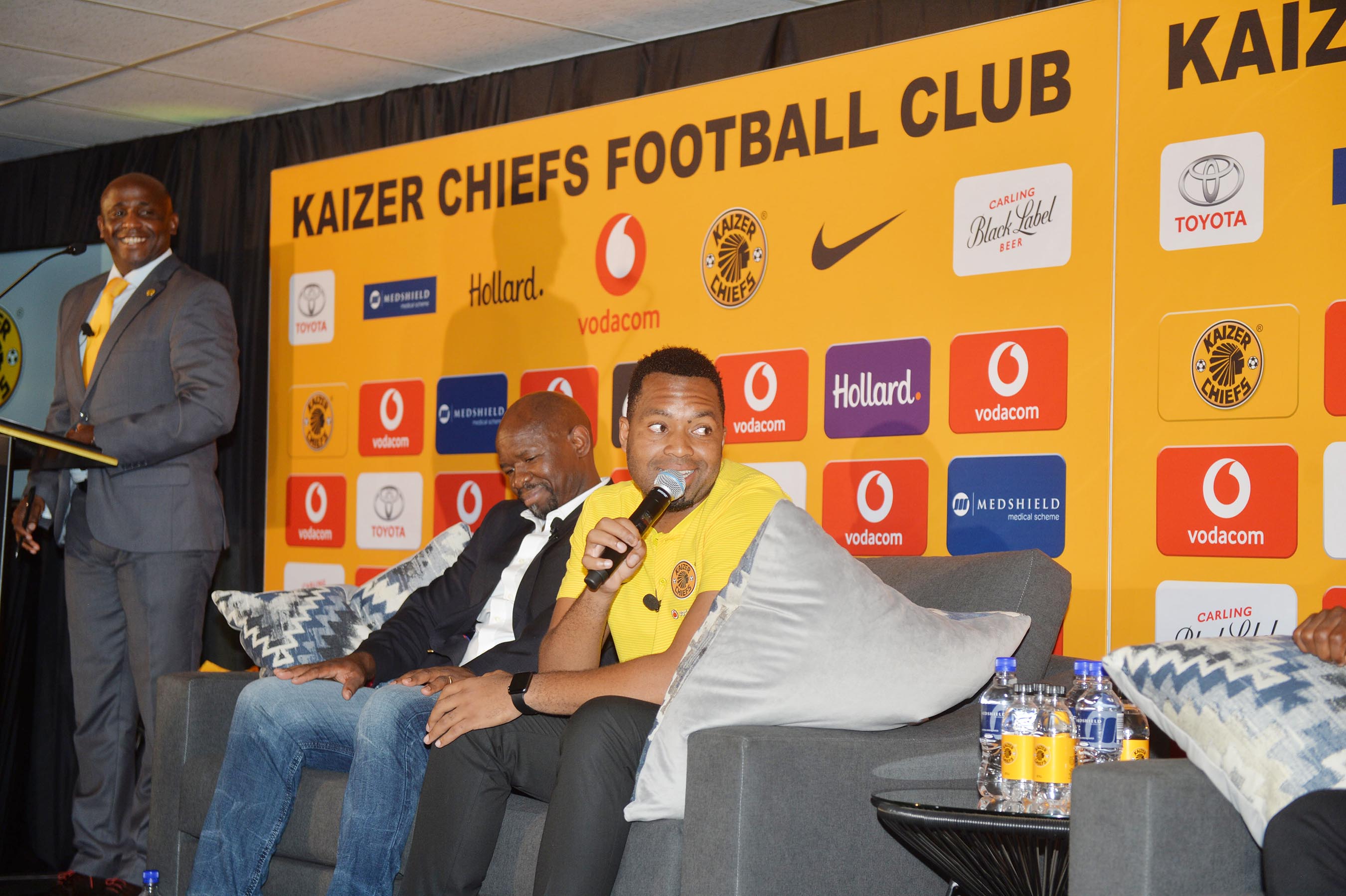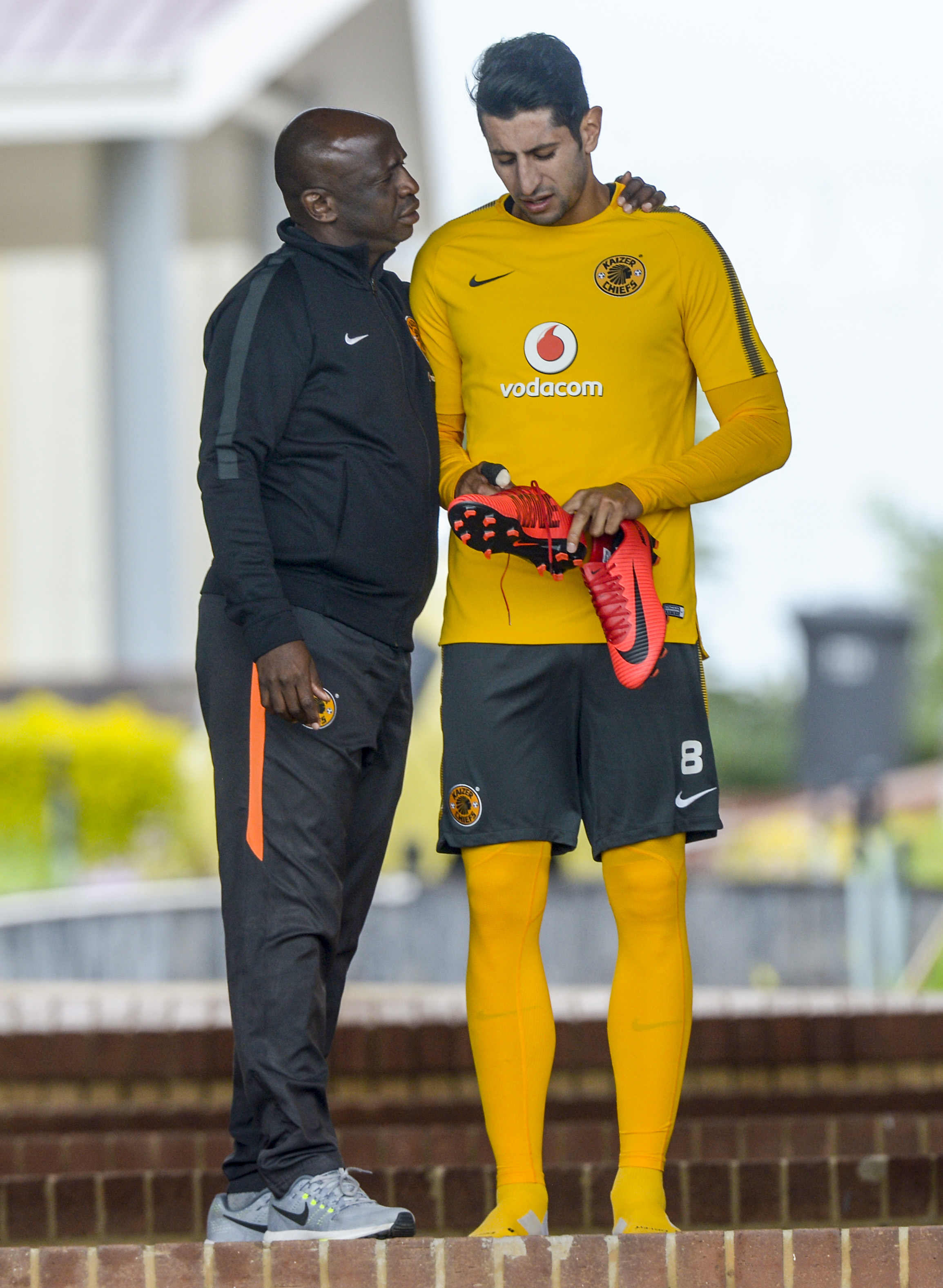Evangelist: Vina Maphosa is a person who believes in his job and sets about it with love and enthusiasm
If you have ever streamed a Kaizer Chiefs press conference, you would have seen the affable Vina Maphosa in action. He takes to the podium to welcome the journalists and guests, often reserving time to crack a joke with Itumeleng Khune or Steve Komphela.
This is his football field. His goal is to ensure the Amakhosi badge stands tall and proud.
The Mail & Guardian caught up with Chiefs’ communications manager to understand what it takes to be the voice behind one of the country’s most recognised sporting brands. It turns out there’s a little more to it than shaking hands with the players for the cameras.
Tell us about your background.
I have an education background. I worked for many years at Vaal University of Technology as a director of what they call co-operative education.
I studied electrical engineering, funnily enough, and business management.
My work in the field of communications is one of those coincidental things.
While I was still at university, I engaged in a lot in things like public speaking, public debates, commentary on sports and current affairs … but that is basically how I got to the field of communications. I was appointed back in 2012 as corporate communications manager of Kaizer Chiefs FC and the rest is history.
How did you get the job?
Through discussions with the club chairman and other members of the club.
Again, it became just coincidental that while we were relating to general matters about the club — as an interested fan and a person interested in seeing the club succeed.
It just so happens that we got to a point of connection where I could give valuable input at the club. It came in the middle of our association in terms of my input, suggestions and simply becoming a brand of the club.
You’re a life-long Chiefs fan?
A big, big, big, big supporter! I have manifested that in many ways. I’m one of those supporters who would always go to the stadium. One of those supporters who would criticise the club when they’re not doing well, but praised them when they are.
I have spoken about the club in public, on public platforms, media. I would call into radio stations just to illustrate my frustrations, illustrate my joy. Primarily I have always had an interest to see this club succeeding.
Now that I’m in the club itself I’m able to see how huge it is and how much it impacts society, how it contributes to nation building, how it affects people in terms of happiness and sadness. All those elements, I’m now able to see them up close and personal.
So you’re living the dream?
I can confirm that. It’s everybody’s wish to be associated with big brands. There’s no way to go around it, it’s a sheer, sheer privilege. When I grew up, I always wanted to be a professional, I always wanted to be in a leadership role, I have always wanted to be a good citizen.
Being associated with Kaizer Chiefs as a brand, it gives impetus to what I aspired to in my aspirant years. It’s living the dream, it’s exciting, it’s everyday joy. It’s a very humongous task that we’re carrying. This club is 48 years old and it’s pioneered by the chairman Kaizer Motaung and other leaders in the club.
You wake up every day under pressure to make it better, to maintain it, to maintain its standing in society. So it’s a challenging job.

Describe the ins and outs of what you do
People that follow the club usually see the tail-end of what we do. The media days, the press conferences, the TV appearances, the radio interviews.
But at a professional set-up like Chiefs, there’s a lot of processes that happen behind closed doors. There’s a lot of quality control and measures that we take before you see what’s on TV, at the matches and so forth.
Football has become so professionalised that we also adhere to professional standards and PSL [Premier Soccer League] compliance rules. We’re not operating in isolation by our own standards only. There’s league rules that we must follow to produce media elements.
It’s very important that people know that it’s not all about what they see in public, there’s a lot of office administration in communications.
What would you advise someone who aspires to be in a position like yours, and what is required?
It’s very standard attributes that are needed. You need to be responsible, you need to be committed. You need to be tuned to be a part of it. You can’t pretend to be in it; you need to be fully, fully dedicated. In your craft, you have to demonstrate an element of high, high standing in the community.
Primarily, you need to know that, when you enter the space of Kaizer Chiefs, you’re representing yourself last — before that you’re representing the badge, the supporters, the sponsors, the general football fraternity. You need to know that it’s not about you.
You have spoken before about getting more exercise. Explain how it relates to the job?
It’s a culture. You’re representing sports, you’re representing football. You have to look the part, you have to preserve the image that is required.
You move from one event to another at high speed and the demands of the office require high energy. You can only achieve that by looking after yourself, after
your body. Exercise is one of the solutions.
How did your workout programme change after joining Chiefs?
As a youngster, I used to be energetic, took part in athletics, played football, near professional level.
As I got into a professional career, I neglected the element of exercise and I bulged, I became big. I realised when I got to Kaizer Chiefs that I had to adapt to the environment and I took up the challenge of running. Now, today, I average 300km a month — in other words, about 10km a day.
Every run represents something. I might be running for fitness on a particular day, I might be running for health, I might be running for pain. Sometimes for spirituality and sometimes I run just for mindfulness to be sober and alert, ready to take on the challenges of the day.

What stands out for you since joining Chiefs?
Obviously, since joining, we had a good time when we won the league in 2013; we then won it again in 2015. We won the Nedbank Cup, we won the MTN Cup. Along the way, a couple of friendly cup matches — Black Label Cup here and there.
Basically, just being part of the set-up of Kaizer Chiefs during the successful times.
Facing up to the challenge of trying to turn this corner and get back to winning ways in the past two years has been a phenomenal challenge. I would like to be a part of getting the team back to its glory days. It makes me wake up every day.